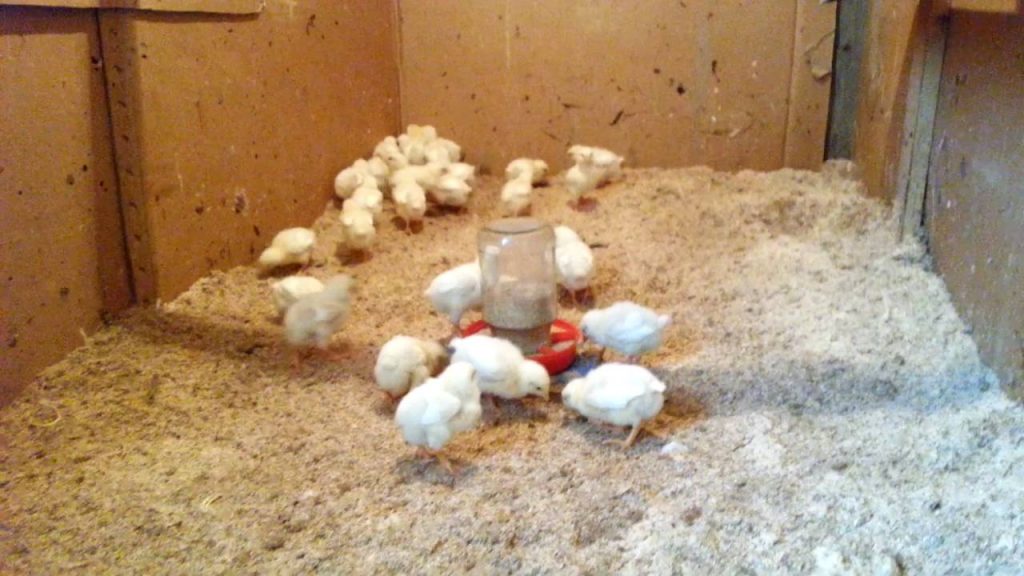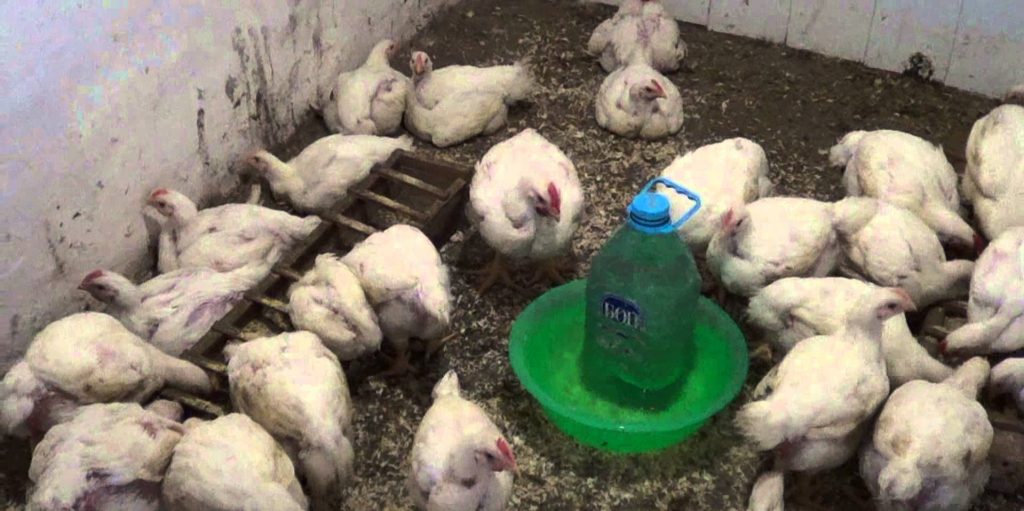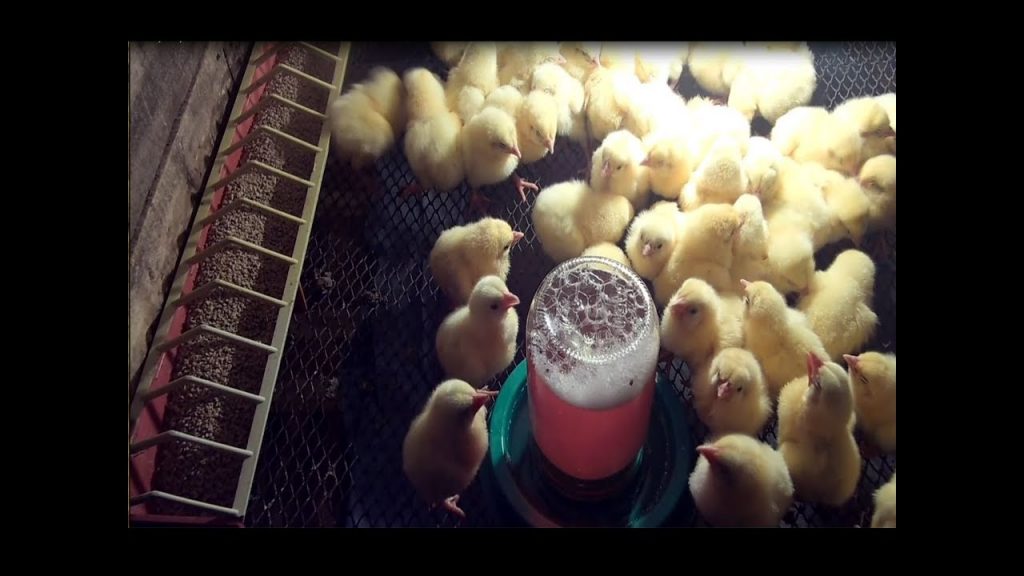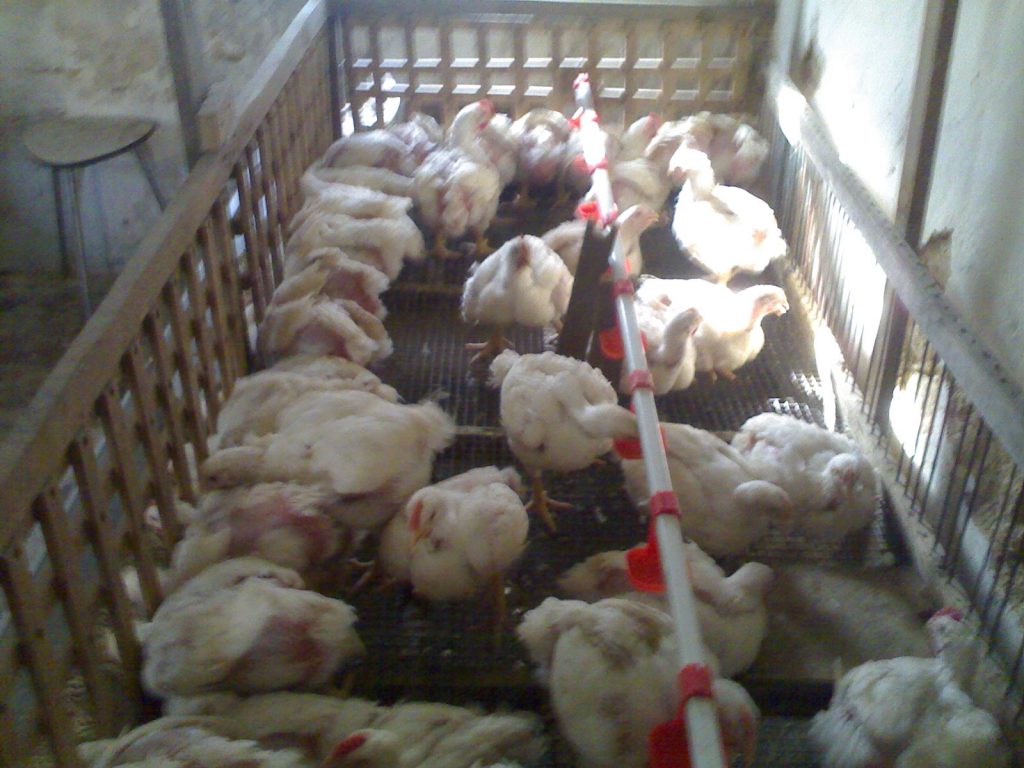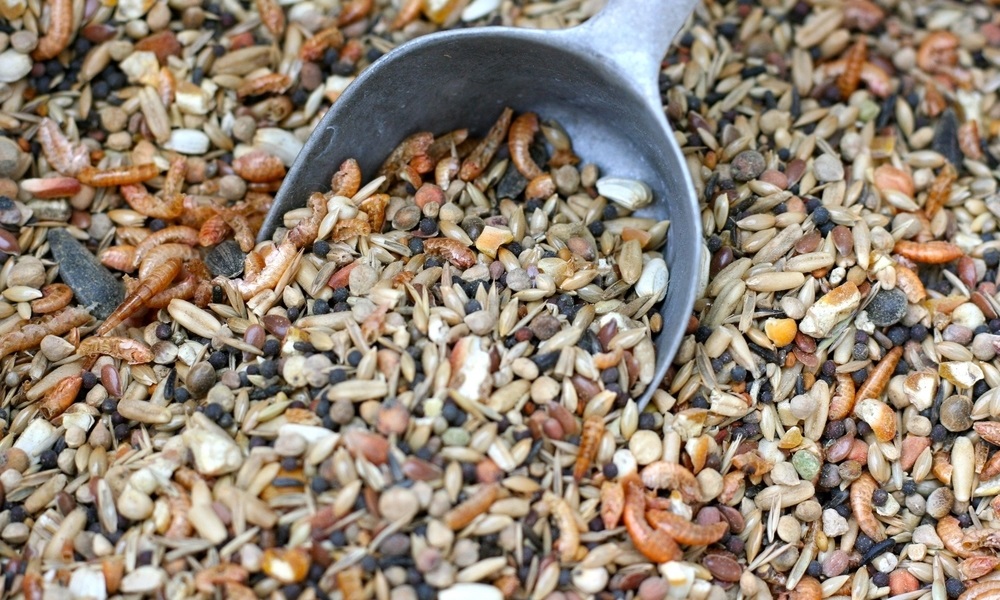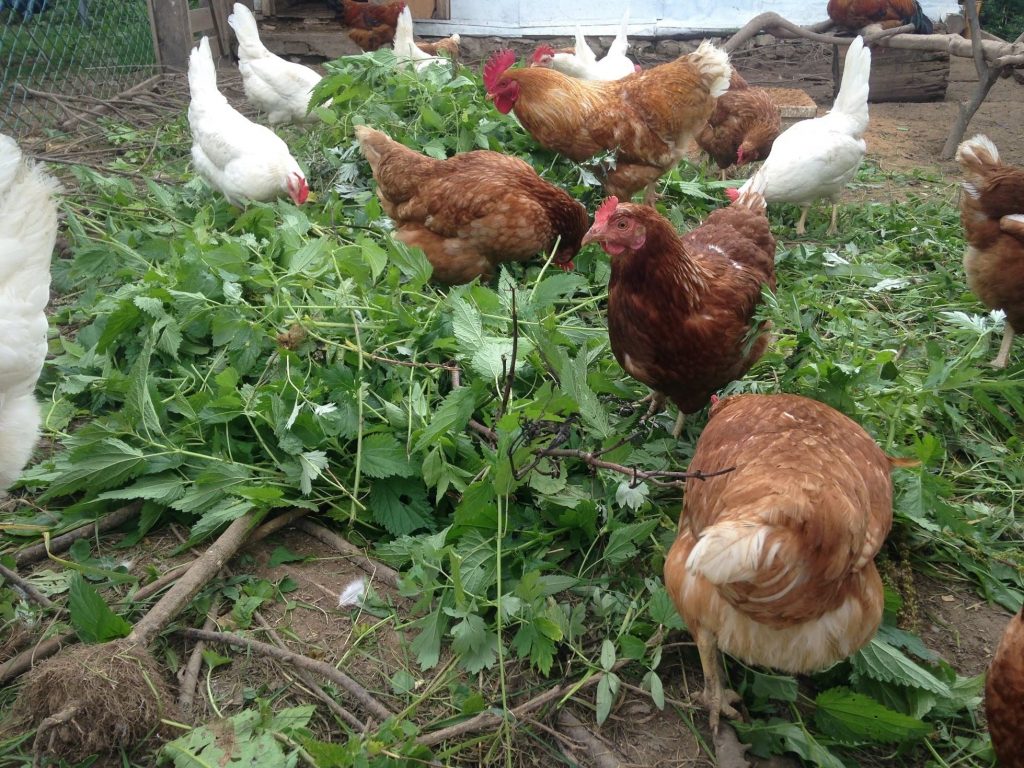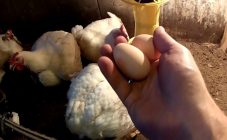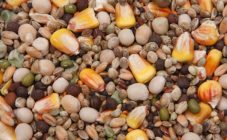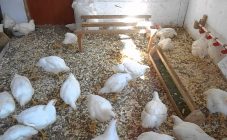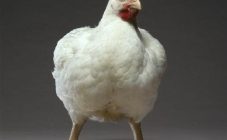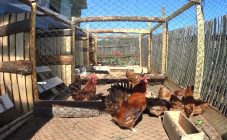Content:
Broiler chickens are interbreeding hybrids. Their main advantage is early maturity. For 7 weeks of life, chickens gain 2.5 kg, by 2 months they weigh about 3 kg, and by 3 - 4-5 kg. Broilers are slaughtered for about 75-80 days. It is unprofitable to keep the living creatures longer, since the weight gain practically stops, but they will consume even more feed.
Broiler and chicken care rules
As a rule, poultry farmers either hatch broiler chickens in an incubator or buy day old babies. One way or another, before you get chickens, you need to take care of the comfortable conditions for their further keeping.
Premises
Broilers are kept either in cages or in a chicken coop. Many breeders, in order to save space, prefer to put cages on top of each other, thus getting two or three-tier "high-rise buildings". When keeping chickens in a cage, their number should not exceed 18-20 birds per 1 m². Provide broilers with clean bedding, which is often sawdust.
The space should be designed so that each hen has easy access to feeders and drinkers. If broilers tilt their head down too much during a meal, raise the dishes to a level that is comfortable for the birds.
During the first week of life, chicks should have round-the-clock lighting. It is desirable that the light be red (the presence of infrared rays is required), since it is softer and more comfortable for babies. Then the daylight hours are increased to 14-17 hours with the replacement of the lamp with a regular one.
Care should be taken to keep broilers away from stuffiness. Their habitat should be well ventilated, but this breed categorically does not tolerate drafts. This is especially true for chickens aged 0-5 days. Temperatures above 30 ° C and below 24 ° C, lack of light and drafts have a detrimental effect not only on newly hatched babies, but often cause the death of the entire livestock.
By following these tips, you won't have to wonder why your chicks are growing poorly and what to do.
Nutrition
The main advantage of broilers is that they gain muscle mass well, and their meat is ideal for human consumption. With improper feeding, living creatures grow much worse, and in some cases this leads to various diseases.
In the first week of life, chickens can only be given millet and egg powder. It is not recommended to feed babies with wet food. It's too early to give them cottage cheese and boiled eggs. Otherwise, it can lead to upsetting the digestive system and even death. It is advisable to drink a veterinary first-aid kit for babies.
Growing broilers can be fed with wet feed or compound feed as food.When preparing the latter with your own hands, you need to give preference to wheat, oats, corn, peas and barley. The feed must contain a sufficient amount of macro- and microelements, vitamins and minerals, otherwise the health of broilers will deteriorate and weight gain may stop. We recommend adding fish oil.
For about 5-7 days, you can give the chickens green feed, but if there is an overabundance in the diet, the chicks may experience gastrointestinal upset and diarrhea. With this symptom, they stop giving the kids such quantities of greens, or they completely remove it from the diet.
From the 12-14th day, chalk and shell, ground into flour, are added to the food. The presence of sand in the feeder is strictly prohibited.
Starting from the 10th day, meat and bone meal and fish meal are mixed into the feed.
Water
Broiler water should always be fresh and clean. You can mix potassium permanganate into it, but you should make sure that the liquid does not change color to pink. In this case, drinking not only does not bring anything useful to broilers, but can also worsen their well-being.
Care must be taken to ensure that the drinking bowls and feeders are always clean, so it is recommended that they be promptly cleaned of all kinds of debris and dirt.
Nutritional Problems
Quite often, poultry farmers are concerned about the question: why broilers do not eat well, what to do?
- Poor appetite in chickens may be due to inappropriate temperature. In hot weather, the need for food is significantly reduced. In this case, it is necessary to provide broilers with free access to oxygen and give them more water to maintain the temperature balance. If the temperature is too low, then it should be raised to the optimum.
- Illness is also the reason for the lack of appetite. Helminthiases, which are common in animals, affect the goiter, esophagus, and gastrointestinal tract. To remedy the situation, you need to give broilers antibiotics and saturate their food with vitamins.
- Moving from one meal to another. When changing diets, chickens need some time to rebuild. For a start, it is better to give the new feed in a ratio of 1: 1 to the old one. In the future, the amount of new feed should be increased, gradually reducing the old ration to zero.
- Inappropriate diet will also suppress appetite in birds. It is advisable to feed broilers at the same time every day.
- Moving to a new place and being frightened provoke stress in animals, due to which the appetite disappears. Keep your broilers at rest and return to their normal diet in a few days.
There are situations when broilers refuse to eat exactly compound feed. The reason for this may be that the feed does not match the age of the bird. For example, after 30 days of life, the content of corn in the feed of 50% is the norm, and at first such an amount is unacceptable.
When buying food, you should check it carefully. If the feed is expired, stored in a damp place, then rotten grains can get into the trough, and broilers will neglect poor-quality food and, as a result, remain hungry.
Why broilers don't drink water
More often than not, broilers refuse to drink water if it is of poor quality. It is necessary to monitor the cleanliness of the drinking bowl, because birds often spoil it themselves, climbing into a container with dirty paws. It is necessary to thoroughly rinse the container from impurities, as they contain bacteria that can cause diseases.
Various goiter diseases are also the reason for the refusal of water. They occur as a result of blockage by fungi from the genus Candida (candidiasis). Then the chicken sits, crumpled, and does not move. Disease prevention consists in cleaning the cage (or chicken coop) and treating it from various parasites.
Why broilers grow poorly
The main reason broilers do not gain weight is poor nutrition. When raising broilers, you need to carefully monitor their feeding. Broilers are best served on a schedule and balanced diet. The feed mixture must contain the required amount of vitamins and minerals, the presence of which can be achieved by feeding the bird with high-quality starter feed purchased in a specialized store.
Another reason why broilers grow poorly may be the disease that struck. In the presence of helminthiasis or damage to the gastrointestinal tract, weight gain stops, and the animals stop growing.
If broilers are kept in an open pen, they will consume a lot of energy to move. Then they stop gaining muscle mass, and ultimately they grow to the required size not by 2-3 months, but by 5.
Why broilers are poorly gaining weight or not growing at all
Unbalanced nutrition, or rather a lack of protein in the feed, is a frequent answer to the question: why broilers do not grow. It is protein that plays a critical role in gaining muscle mass. Neglecting the purchase of quality feed and trying to save money, poultry farmers often do not think about the future consequences for the growth of livestock. Only high-quality food filled with the necessary elements will ultimately bring the desired result.
Excessive mobility and activity also slows down the chicken's weight gain, because then the birds will spend all their energy on movement, and not on weight gain.
To normalize the growth of broilers, all causes of its delay must be eliminated. It is worth providing the chickens with good nutrition, removing physical obstacles and making sure that this does not recur in the future.
Why broilers don't fledge
Feathers protect the body from low temperatures, wind and other factors, therefore, they are essential for the normal functioning of the body.
Normally, already on the second day of life, the chickens have a small number of feathers, and by the age of 3 weeks the bird is already fully feathered. However, sometimes feather growth is delayed, which worries poultry farmers.
The lagging feathering in broilers can be explained by the fact that feather growth lags behind the growth rate of the chicken as a whole. In this case, the feeling is created that the bird is covered with feathers only on certain parts of the body.
The causes of both alopecia and lagging plumage are:
- Incorrect content. Insufficient lighting, poor ventilation and drafts are detrimental to broilers and can cause all sorts of diseases and disorders. Plumage also directly depends on these factors.
- Feeding plays the most important role in broiler life. The lack of essential components in the feed badly affects the functioning of the body as a whole, including the plumage.
- Infectious diseases affecting the body can provoke alopecia or stunted feathers in broilers. To avoid problems of this kind, you need to monitor the health and appearance of chickens, their conditions of detention and nutrition.
Tips and tricks from experienced poultry farmers
Broilers are best purchased in early spring (March-April). During this period, the chicks are stronger, healthier and easier to adapt to temperature changes and weather conditions.
For example, you can compare the crosses of broilers KOBB-500 and ROSS-308. The former have more massive legs and should be larger before slaughter. In ROSS-308, the bulk of muscle mass is formed at an early age, and they have a lower survival rate.However, if you buy broilers ROSS-308 in the spring, and KOBB-500 closer to the middle of summer, then the cross ROSS-308 will be larger, and its weight will be more than that of the “competitors”. In addition, starting a bird in the spring, during the warm season, it will be possible to grow two batches of broilers.
- Broilers need to be fed greens. They eat chopped nettles, alfalfa, radish leaves with appetite. The grass should be ripped or mowed just before feeding to keep it fresh and juicy. You need to start adding greens to food no earlier than 4 days.
- Since it is in the starter feed that contains the largest amount of useful components, some poultry farmers feed broilers with them, refusing to grow and finish. It is best to observe what feed the bird eats with great appetite, and give preference to it, but do not forget that the main task of broilers is to gain weight.
- When broilers are kept in a cage, an accelerated increase in muscle mass is observed than when kept in a pen. In any case, overactive activity will stall the broiler's weight gain, so their physical activity should be kept to a minimum.
- In order not to ask questions why broilers do not gain weight well and what to do, you need to study all the features of caring for them and the rules for their maintenance before buying birds. Then the problems will be much less, and the business will be enjoyable.
Keeping broilers is a profitable business. Knowing the nuances of development and paying enough attention to poultry, in a couple of months you can get high-quality homemade meat, which is great for consumption, or you can start a business selling broiler meat.
